Day 1 – Wednesday 10th January 2024
Departure
The Murihiku ki te Toka rōpu consisting of Riki Parata (Team Lead), Karlee Nicholas Tāne Tamati, Luka Finn (Ngāi Tahu whānui Researchers), with Scientific Lead Regina Eisert and Technical Operations Lead Colin Aitchison boarded the Heritage Adventurer at Southport Bluff. The team settled in with approximately 100 other passengers and 80 crew then undertook Health and Safety briefings including abandon ship protocols. The rōpu then were briefed on the following day heading to the Snares, introduced to the crew of Heritage, followed by dinner and departure of Bluff. The rōpu had to develop last minute entry permits to the Auckland Islands once a plan had been provided by Heritage Expeditions, to be then provided to DOC for approval at least 24 hrs before entry.
Day 2 – Thursday 11th January 2024
The Snares
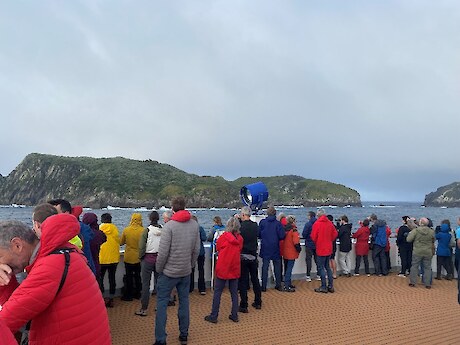 Arrival at the Snares
Arrival at the Snares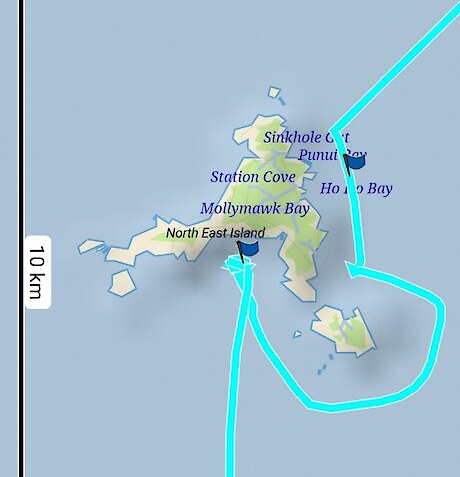 Map of Snares where Heritage went.Weather played a major part in where we could land around the snares and after reaching the northern tip in the early morning, it was decided by the Captain to head to the southern tip in the hope of finding some calmer seas. It was touch and go whether or not we would be able to get in the zodiacs for a trip around the Snares. Luckily the southern end was sheltered from the multi-directional winds coming into the Snares. The rōpu headed off on a three-hour zodiac ride around the entire southern end of the Snares, landing is not permitted on the Snares unless a management or research permit is granted. The amount of seabirds were overwhelming with sooty shearwater, prions, albatross, and petrels, as far as the eye could see. Tītī burrows could be seen on the mainland from the boats, and the marine wildlife was abundant with krill on mass on top of the moana, with huge bait balls forming around which led to larger fish species, penguins, and seabirds making the most of the feeding frenzy. The Ngāi Tahu whānui were unable to undertake a cultural assessment on the zodiac due to weather or on the Snares Island itself due to restrictions, so instead the assessment was done on board the Heritage once the zodiac cruise was completed. The Heritage then set sail to the Auckland Islands. The evening was filled with biosecurity exercises, which involved cleaning gear for landing the next day, dinner, introductions of the remaining captain and support crew, and presentations about the Snares and seabirds. Last minute changes by Heritage to the Auckland trip saw an opportunity for the rōpu to visit Ranui and Hardwicke settlements, this meant that additions to the entry permits were needed to accommodate the two existing sites. DoC were accommodating to be able to process these changes under the 24hr recommendation period.
Map of Snares where Heritage went.Weather played a major part in where we could land around the snares and after reaching the northern tip in the early morning, it was decided by the Captain to head to the southern tip in the hope of finding some calmer seas. It was touch and go whether or not we would be able to get in the zodiacs for a trip around the Snares. Luckily the southern end was sheltered from the multi-directional winds coming into the Snares. The rōpu headed off on a three-hour zodiac ride around the entire southern end of the Snares, landing is not permitted on the Snares unless a management or research permit is granted. The amount of seabirds were overwhelming with sooty shearwater, prions, albatross, and petrels, as far as the eye could see. Tītī burrows could be seen on the mainland from the boats, and the marine wildlife was abundant with krill on mass on top of the moana, with huge bait balls forming around which led to larger fish species, penguins, and seabirds making the most of the feeding frenzy. The Ngāi Tahu whānui were unable to undertake a cultural assessment on the zodiac due to weather or on the Snares Island itself due to restrictions, so instead the assessment was done on board the Heritage once the zodiac cruise was completed. The Heritage then set sail to the Auckland Islands. The evening was filled with biosecurity exercises, which involved cleaning gear for landing the next day, dinner, introductions of the remaining captain and support crew, and presentations about the Snares and seabirds. Last minute changes by Heritage to the Auckland trip saw an opportunity for the rōpu to visit Ranui and Hardwicke settlements, this meant that additions to the entry permits were needed to accommodate the two existing sites. DoC were accommodating to be able to process these changes under the 24hr recommendation period.
Day 3 – Friday 12th January 2024
The Auckland Islands
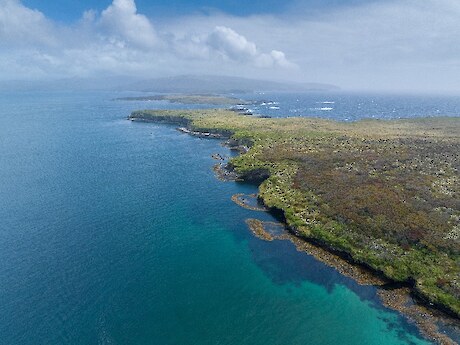 After a full night’s steaming the Heritage Adventurer reached the Auckland Islands early on Friday morning. Here the Murihiku ki te Tonga rōpu separated with the four Ngāi Tahu members heading to Ranui settlement and Hardwicke Settlement, where a cultural assessment was undertaken at Hardwicke encapsulating both sites. Nathan Russ accompanied the Ngāi Tahu team and gave a historical overview of the two sites, and they visited the still erect huts where the Coastwatchers lived during WW2. Knowing that there had been Māori settled in these places contributed to the assessment and the Ngāi Tahu researchers felt connected to the place through the assessment. Auckland Island is not pest-free and this was noticed considerably after visiting the Snares the day before. The damage inflicted by introduced species diminished the mauri, mana, and wairua of the place, however opportunity was still present for future management and research. The other two members of the rōpu, Colin and Regina, headed straight to Enderby Island at 8am to undertake drone operations. This mahi was identified after collaboration with Ngāi Tahu researchers Gerald O’Regan and Matiu Prebble, building on their archaeological expedition in March 2023. The opportunity to gather Multi-spectral, high-resolution, and Thermal imaging of the known archaeological sites, and extend the photography wider along Sandy Bay on Enderby Island, will give the previous research team more data to determine if other sites could be excavated. It also gives the opportunity to identify any unique markers consistent with arch sites, to then be used to look for other arch sites on other islands. The Ngāi Tahu team then meet up with Regina and Colin in the afternoon, after some sightseeing, and exploring a ling the Coast. Once the full rōpu gathered on Enderby Island, the Ngāi Tahu contingent headed to the sand dunes where middens were openly exposed. This is where another cultural assessment was undertaken. This assessment was unique in the fact that known Māori settlements and activities took place here, the team was surrounded by Hooker sea lions, hoiho, pipet, giant petrels, and a variety of other sea birds, all within 10 metres of the researchers. This was one of the most connected and spiritual of the cultural assessments to date. The drone team was able to achieve all the photography required with the equipment available and the weather contributed to a successful day of data gathering.
After a full night’s steaming the Heritage Adventurer reached the Auckland Islands early on Friday morning. Here the Murihiku ki te Tonga rōpu separated with the four Ngāi Tahu members heading to Ranui settlement and Hardwicke Settlement, where a cultural assessment was undertaken at Hardwicke encapsulating both sites. Nathan Russ accompanied the Ngāi Tahu team and gave a historical overview of the two sites, and they visited the still erect huts where the Coastwatchers lived during WW2. Knowing that there had been Māori settled in these places contributed to the assessment and the Ngāi Tahu researchers felt connected to the place through the assessment. Auckland Island is not pest-free and this was noticed considerably after visiting the Snares the day before. The damage inflicted by introduced species diminished the mauri, mana, and wairua of the place, however opportunity was still present for future management and research. The other two members of the rōpu, Colin and Regina, headed straight to Enderby Island at 8am to undertake drone operations. This mahi was identified after collaboration with Ngāi Tahu researchers Gerald O’Regan and Matiu Prebble, building on their archaeological expedition in March 2023. The opportunity to gather Multi-spectral, high-resolution, and Thermal imaging of the known archaeological sites, and extend the photography wider along Sandy Bay on Enderby Island, will give the previous research team more data to determine if other sites could be excavated. It also gives the opportunity to identify any unique markers consistent with arch sites, to then be used to look for other arch sites on other islands. The Ngāi Tahu team then meet up with Regina and Colin in the afternoon, after some sightseeing, and exploring a ling the Coast. Once the full rōpu gathered on Enderby Island, the Ngāi Tahu contingent headed to the sand dunes where middens were openly exposed. This is where another cultural assessment was undertaken. This assessment was unique in the fact that known Māori settlements and activities took place here, the team was surrounded by Hooker sea lions, hoiho, pipet, giant petrels, and a variety of other sea birds, all within 10 metres of the researchers. This was one of the most connected and spiritual of the cultural assessments to date. The drone team was able to achieve all the photography required with the equipment available and the weather contributed to a successful day of data gathering.
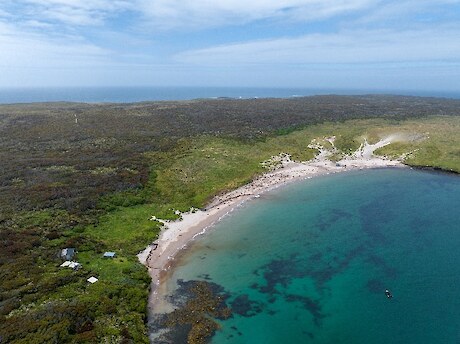 That evening Riki Parata was asked to provide a presentation and introduction of the team. Riki discussed who Ngāi Tahu were and why they were aboard the trip highlighting the relationship between Heritage Expeditions and Ngāi Tahu. He mentioned that there would be more presentations over the next few weeks with more detail, and for the passengers and crew to come and get to know the team throughout the journey. The night was completed with other presentations from Rondey Russ and other crew members followed by dinner. The Heritage Adventurer then departed for Macquarie Island that night.
That evening Riki Parata was asked to provide a presentation and introduction of the team. Riki discussed who Ngāi Tahu were and why they were aboard the trip highlighting the relationship between Heritage Expeditions and Ngāi Tahu. He mentioned that there would be more presentations over the next few weeks with more detail, and for the passengers and crew to come and get to know the team throughout the journey. The night was completed with other presentations from Rondey Russ and other crew members followed by dinner. The Heritage Adventurer then departed for Macquarie Island that night.
Day 4 – Saturday 13th January 2024
At Sea
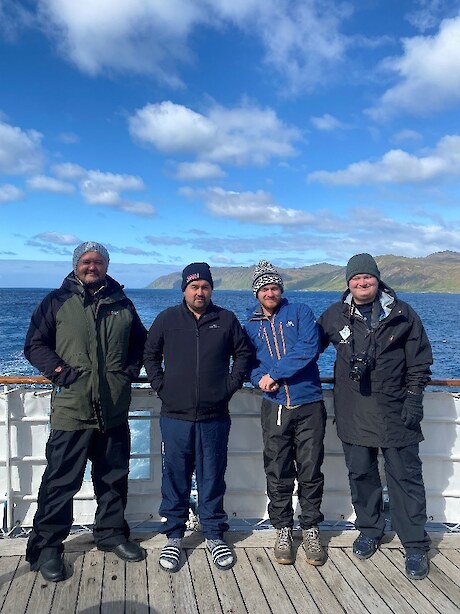 A full day of traveling the ocean on Saturday as Macquarie Island was 36 hours from the Auckland Islands. This meant many of the passengers caught up on sleep, organised videos, took pictures of wandering albatross and accompanying petrels, or hid away in their cabins from the stormy seas. There were presentations throughout the day including a literature review from Rodney Russ about the books aboard the Heritage and other Seabird and Sub-Antarctic books, a presentation about the many different kinds of seabirds, and also about Macquarie Island. There are also 15 Young Explorer scholarship recipients aging from 18 to 30, which is sponsored by Heritage Expeditions. A couple of them got up and introduced themselves and the work they are involved in. This was followed by a debrief and update of the following days activities. The rōpu used this opportunity to tidy up cultural assessments, edit data and drone footage, and write up reports for the programme.
A full day of traveling the ocean on Saturday as Macquarie Island was 36 hours from the Auckland Islands. This meant many of the passengers caught up on sleep, organised videos, took pictures of wandering albatross and accompanying petrels, or hid away in their cabins from the stormy seas. There were presentations throughout the day including a literature review from Rodney Russ about the books aboard the Heritage and other Seabird and Sub-Antarctic books, a presentation about the many different kinds of seabirds, and also about Macquarie Island. There are also 15 Young Explorer scholarship recipients aging from 18 to 30, which is sponsored by Heritage Expeditions. A couple of them got up and introduced themselves and the work they are involved in. This was followed by a debrief and update of the following days activities. The rōpu used this opportunity to tidy up cultural assessments, edit data and drone footage, and write up reports for the programme.
Day 5 – Sunday 14th January 2024
Macquarie Island
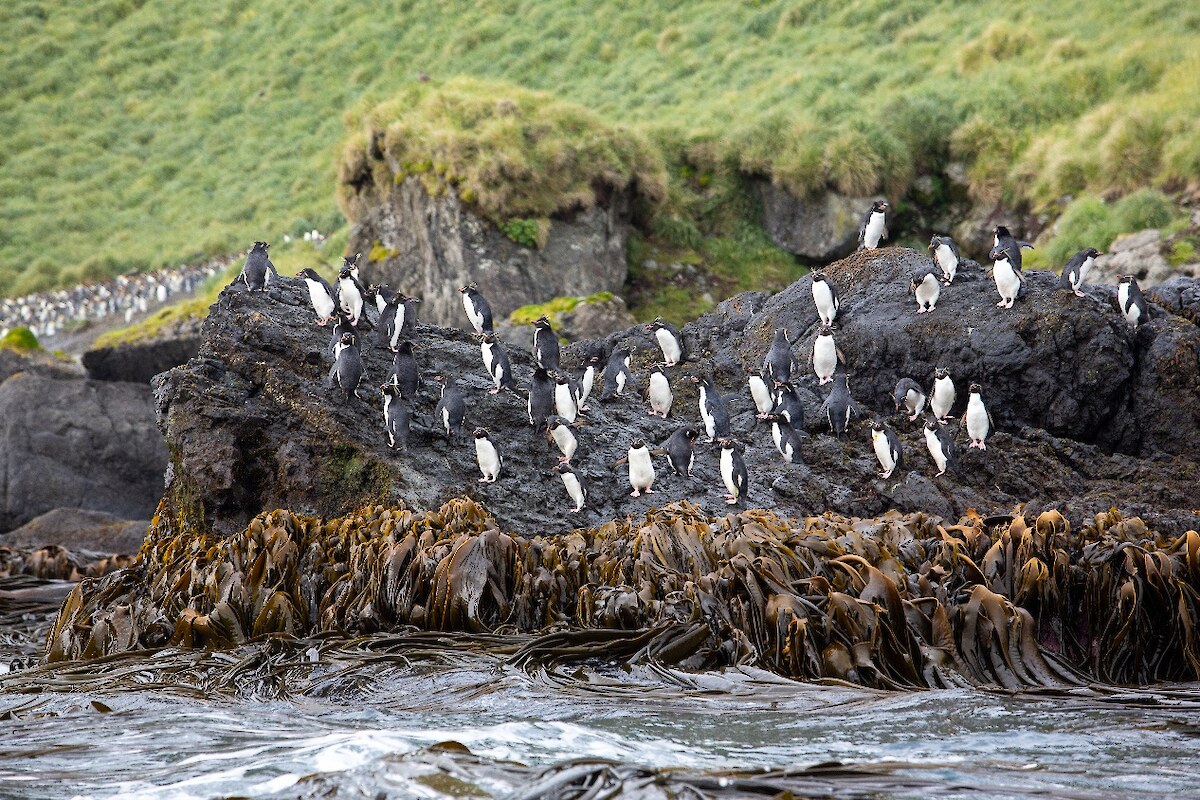 We were greeted to a fine morning and the sight of Macquarie Island on Day 5. As the team were technically in Australian waters, the Murihiku ki te toka rōpu had to be tourists while on the island as no study could be undertaken on the island. The Ngāi Tahu contingent did decide to do a cultural assessment from their time on Macquarie Island. This is due to the fact the island used to be under New Zealand ownership, and a comparative study was thought useful of another sub-Antarctic island now under non-New Zealand regulation.
We were greeted to a fine morning and the sight of Macquarie Island on Day 5. As the team were technically in Australian waters, the Murihiku ki te toka rōpu had to be tourists while on the island as no study could be undertaken on the island. The Ngāi Tahu contingent did decide to do a cultural assessment from their time on Macquarie Island. This is due to the fact the island used to be under New Zealand ownership, and a comparative study was thought useful of another sub-Antarctic island now under non-New Zealand regulation.
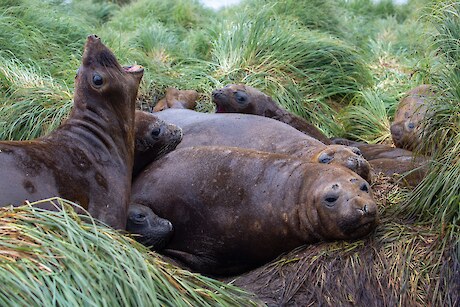 The day was filled with zodiac rides and walks to royal and king penguin colonies, as well as elephant seal colonies. The island was also noted for its unique geology as having been forms from the same fault line as New Zealand. Tāne Tamati was in his element and enjoyed sharing his geological knowledge with the passengers and rōpu. It was a long day out on the island and enjoyed the unique wildlife. The Heritage Explorer anchored at Sandy Bay for the night, and a debrief was provided for the next day.
The day was filled with zodiac rides and walks to royal and king penguin colonies, as well as elephant seal colonies. The island was also noted for its unique geology as having been forms from the same fault line as New Zealand. Tāne Tamati was in his element and enjoyed sharing his geological knowledge with the passengers and rōpu. It was a long day out on the island and enjoyed the unique wildlife. The Heritage Explorer anchored at Sandy Bay for the night, and a debrief was provided for the next day.
Day 6 – Monday 15th January 2024
Half a day at Macquarie Island and sailing south
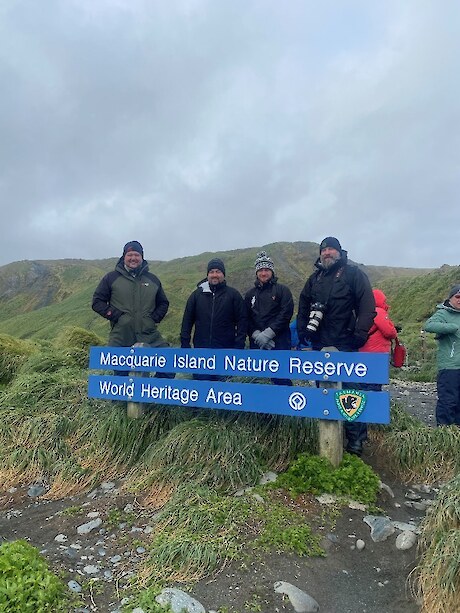 Heritage Adventurer made its way north to Buckles Bay at Macquarie Island where the morning was filled with another landing at the Australian research base. Here a resident colony of penguins live. The team had a tour outside of the research station and saw more elephant seal and king penguin colonies. The weather had picked up a bit and it really felt like we were getting closer to Antarctica today.
Heritage Adventurer made its way north to Buckles Bay at Macquarie Island where the morning was filled with another landing at the Australian research base. Here a resident colony of penguins live. The team had a tour outside of the research station and saw more elephant seal and king penguin colonies. The weather had picked up a bit and it really felt like we were getting closer to Antarctica today.
